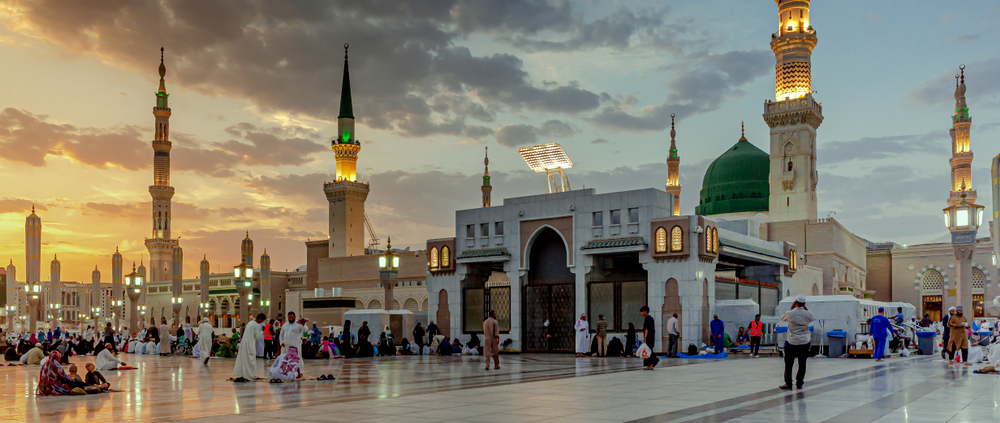Is Our Name Mentioned in the Presence of the Prophet When We Send Salawat upon Him, Allah Bless and Give Him Peace?
Answered by Mawlana Ilyas Patel
Question
When we send salutations to the Prophet (Allah bless him and give him peace), is our name specifically mentioned by the Prophet himself, the Jibril himself, and Allah Himself in response to our dua? If that is the case, I would like to read the hadiths mentioning such honor.
Answer
In the Name of Allah, the Most Merciful and Compassionate.
I pray you are in good faith and health. Thank you for your question.
Yes, sending prayers upon the Prophet (Allah bless him and give him peace) is a means for the name of the person sending them to be presented to the Prophet and having his name mentioned in his noble presence. It is a great honor, nobleness, and virtue for a Muslim’s name to be mentioned in the presence of the Messenger of Allah ((Allah bless him and give him peace).
Bazzar reported from ‘Ammar ibn Yasir, who said: “The Messenger of Allah (Allah bless him and give him peace) said: Verily, Allah has entrusted an Angel at my grave to whom Allah has given the names of creation. No one sends prayers upon me until the Day of Resurrection except that he (the Angel) conveys to me his name and the name of his father (saying): ‘So-and-so, the son of so-and-so, has sent prayers upon you.’” [Bazzar, Musnad al-Bazzar]
Hafiz al-Mundhiri said this was reported by Abu al-Shaykh and Ibn Hibban, whose wording reads: “The Messenger of Allah said: ‘Verily, Allah, the Blessed and Exalted, has an Angel to whom He has given the names of creation and he is standing by my grave when I pass away. So no one sends prayers upon me except that he says: ‘O Muhammad! So-and-so, the son of so-and-so, has sent prayers upon you.’ Then the Lord, the Blessed and Exalted, will send prayers upon that man ten times for every time (he sends one prayer).’” [Ibn Hibban]
This was reported by Tabarani in al-Kabir in a similar narration and with a second narration that reads: “The Messenger of Allah said: ‘Verily, to Allah belongs an Angel to whom He has granted the hearing of the servants (the ability to hear them); there is no one who sends prayers upon me except that he conveys it to me. Indeed, I asked that no servant send a prayer upon me save that He sends upon him ten prayers of its like.’” [Tabarani, al-Mu’jam al-Kabir] [Abdullah Sirajuddin, Sending Prayers Upon the Prophet]
How Much Salawat Should We Dedicate to Bless the Prophet?
Ubayy ibn Ka’b (Allah be pleased with him) reported: I said, “O Messenger of Allah, I send blessings upon you often. How many of my prayers should be for blessings upon you?” The Prophet said, “As you wish.” I said, “A fourth?” The Prophet said, “As you wish, but more is better for you.” I said, “A half?” The Prophet said, “As you wish, but more is better for you.” I said, “Two-thirds?” The Prophet said, “As you wish, but more is better for you.” I said, “Should I say all of my prayers for blessings upon you?” The Prophet said, “If so, your worries will be resolved, and your sins will be forgiven.” [Tirmidhi]
I would like you to go through the valuable answers and links below. You will receive guidance and direction, in sha’ Allah.
Related:
- Salawat: The Virtues, Number, and Manner – Shaykh Faraz Rabbani
- The Blessings of Sending Salawat upon our Beloved Muhammad
- salawat on the Prophet Archives
- Sending Prayers upon the Prophet ﷺ. [Book]
Why not begin your search for knowledge by signing up for a course on SeekersGuidance?
I pray this helps with your question.
Wassalam,
[Mawlana] Ilyas Patel
Checked and Approved by Shaykh Faraz Rabbani
Mawlana Ilyas Patel is a traditionally-trained scholar who has studied in the UK, India, Pakistan, Syria, Jordan, and Turkey. He started his early education in the UK. He went on to complete the hifz of the Quran in India, then enrolled in an Islamic seminary in the UK, where he studied the secular and ‘Aalimiyya sciences. He then traveled to Karachi, Pakistan. He has been an Imam in Rep of Ireland for several years. He has taught hifz of the Quran, Tajwid, Fiqh, and many other Islamic sciences to children and adults onsite and online extensively in the UK and Ireland. He taught at a local Islamic seminary for 12 years in the UK, where he was a librarian and a teacher of Islamic sciences. He currently resides in the UK with his wife. His interest is a love of books and gardening.
